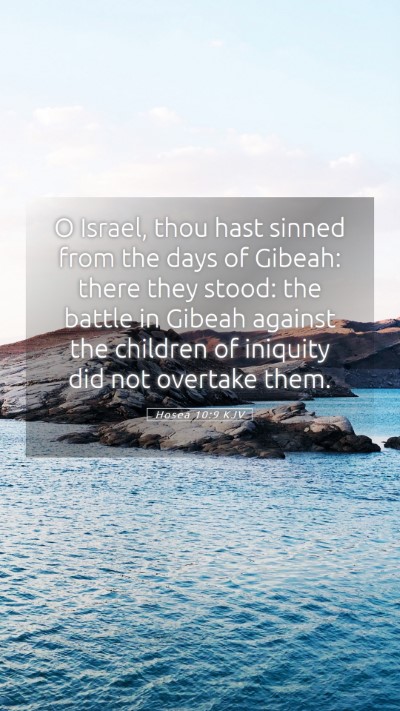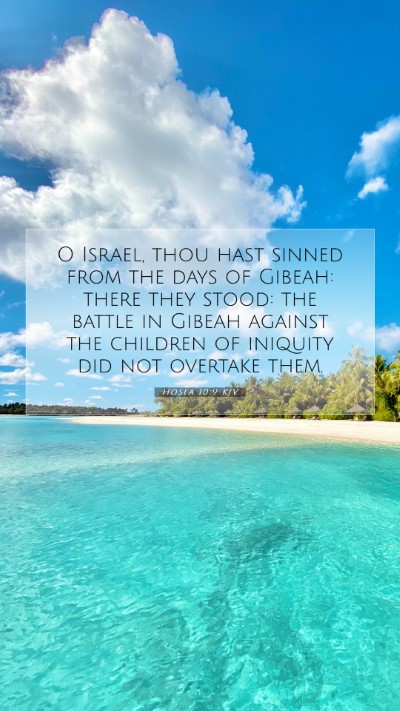Old Testament
Genesis Exodus Leviticus Numbers Deuteronomy Joshua Judges Ruth 1 Samuel 2 Samuel 1 Kings 2 Kings 1 Chronicles 2 Chronicles Ezra Nehemiah Esther Job Psalms Proverbs Ecclesiastes Song of Solomon Isaiah Jeremiah Lamentations Ezekiel Daniel Hosea Joel Amos Obadiah Jonah Micah Nahum Habakkuk Zephaniah Haggai Zechariah MalachiHosea 10:9 Meaning
What is the meaning of Hosea 10:9?
O Israel, thou hast sinned from the days of Gibeah: there they stood: the battle in Gibeah against the children of iniquity did not overtake them.
Hosea 10:9 Bible Verse Meaning
Understanding Hosea 10:9 - An In-Depth Bible Verse Interpretation
Hosea 10:9 states: "O Israel, thou hast sinned from the days of Gibeah: there they stood; the battle in Gibeah against the children of iniquity did not overtake them."
In this verse, the prophet Hosea draws on historical references to convey a message about Israel's persistent sinfulness and the implications of their actions.
Bible Verse Meanings
According to Matthew Henry, this verse reflects Israel's long-standing history of rebellion against God beginning from the days of Gibeah, which signifies a foundational moment of sin. The mention of Gibeah is crucial as it symbolizes not only a geographical location but a spiritual state of failure and moral depravity that the nation has not overcome.
Albert Barnes highlights that this verse illustrates the consequences of iniquity. The phrase "the children of iniquity" indicates that the enemies of Israel were engaged in sinful practices, yet the lack of consequence from sin for Israel shows God's mercy, which they continually forsook.
As per Adam Clarke, there is a historical significance to Gibeah’s battle—it represents not only an ancient attack but also an ongoing struggle with sin as the nation continually fails to learn from its history. The exhortation serves as a call to repent from this cycle of wrongdoing.
Biblical Exegesis and Context
Hosea's prophetic role was to reach out to a nation steeped in idolatry and immorality. This verse captures the essence of that message: the reminder that sin is rooted deeply in Israel's identity. Understanding the historical context of Gibeah, which relates to events in the Book of Judges (Judges 19-20), is essential for interpreting the message of Hosea accurately.
The phrase "the battle in Gibeah against the children of iniquity did not overtake them" can suggest that despite Israel's pervasive sin, they have not been fully destroyed—indicating both the mercy of God and a warning that judgment is imminent if they do not turn from their ways.
Insights for Bible Study Groups
- Historical Context: Discuss the events of Gibeah and their relevance to modern Christian conduct.
- Moral Lessons: Explore the dangers of repeating the sins of the past.
- Repentance: Reflect on personal and communal repentance in light of Israel's failures.
Application of the Verse in Daily Life
When considering the application of Hosea 10:9, it encourages believers to reflect on their own lives and recognize areas where sin may be similar to the historical transgressions of Israel. Repentance and turning away from sin is a central theme that invites personal and communal introspection.
Hosea’s call to repentance is timeless, emphasizing the need for individuals to evaluate their choices and ensure that their actions align with God’s will. The verse serves as a warning against complacency and encourages vigilance in both personal and community faith practices.
Cross References
- Judges 19-20: The story of Gibeah; the origin of the issues Hosea addresses.
- Isaiah 59:2: The consequences of sin leading to separation from God.
- Amos 3:2: A reminder that God holds His people accountable for their actions.
Conclusion
Hosea 10:9 is a powerful reminder of the long-standing consequences of sin and the urgent call to repentance. Incorporating insights from Matthew Henry, Albert Barnes, and Adam Clarke provides a comprehensive understanding of the verse. It serves as a foundational text for both individual and communal Bible study, highlighting the importance of recognizing historical sin to prevent a cycle of iniquity in the present and future.


